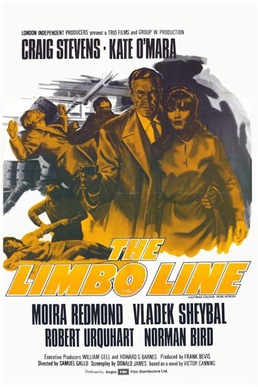The Limbo Line
1968 British film by Samuel Gallu From Wikipedia, the free encyclopedia
The Limbo Line is a 1968 British spy thriller film directed by Samuel Gallu and starring Craig Stevens, Kate O'Mara and Eugene Deckers.[1][2] It is based on the 1963 novel of the same title by Victor Canning. It was made as part of a 1960s boom in spy films in the wake of the success of the James Bond series.
| The Limbo Line | |
|---|---|
 | |
| Directed by | Samuel Gallu |
| Written by | Donald James |
| Based on | The Limbo Line by Victor Canning |
| Produced by | Frank Bevis William J. Gell |
| Starring | Craig Stevens Kate O'Mara Eugene Deckers |
| Cinematography | John Wilcox |
| Edited by | Peter Weatherley |
| Music by | Johnnie Spence |
Production companies | Trio Films London Independent Producers |
| Distributed by | London Independent Producers |
Release date |
|
Running time | 99 minutes |
| Country | United Kingdom |
| Language | English |
Plot
Through a network known as the "Limbo Line", the KGB is kidnapping figures who have recently defected to the West and returning them to the Soviet Union for punishment. A British intelligence agent identifies the ballerina Irina Tovskia as the next victim, and sets out to rescue her in a mission that takes him from London, to Amsterdam and finally to Lübeck on the East German border. He is able to destroy the Limbo Line, but not prevent Irina being taken to Moscow.
Production
It was shot at Pinewood Studios with sets designed by the art director Scott MacGregor.
Reception
The Monthly Film Bulletin wrote: "Naively propagandist espionage thriller. Hackneyed dialogue, feeble direction and ludicrous histrionics from most of the cast give the impression of something left over from the worst days of the Cold War."[3]
The Times called it old-fashioned.[4]
The Morning Star reviewed it as "disastrously incompetent".[5]
Cast
- Craig Stevens as Richard Manston
- Kate O'Mara as Irina Tovskia
- Eugene Deckers as Cadillet
- Moira Redmond as Ludmilla
- Vladek Sheybal as Oleg
- Yolande Turner as Pauline
- Jean Marsh as Dilys
- Rosemary Rogers as Joan Halst
- Hugo De Vernier as Halst
- Alan Barry as Williams
- James Thornhill as Pieter
- Norman Bird as John Chivers
- Frederick Jaeger as Alex
- Eric Mason as Castle
- Denys Peek as Jan
- Robert Urquhart as Edward Hardwick
- Ferdy Mayne as Sutcliffe
- Joan Benham as Lady Faraday
- John Horsley as Richards
References
Bibliography
External links
Wikiwand - on
Seamless Wikipedia browsing. On steroids.
